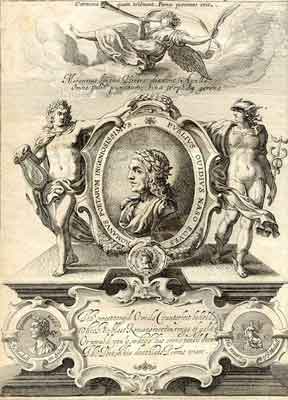- Latin text
- University of Virginia: Metamorphoses
- The Latin Library: P. OVIDI NASONIS OPERA
- English translation
- By A. S. Kline, 2000
- Poetry in Translation: Ovid: Metamorphoses. (Enhanced viewer with links and notes. Can be downloaded in different formats.)
- Mythology: Metamorphoses
- By Sir Samuel Garth, John Dryden et al., 1717
- Internet Classics Archive: Ovid's Metamorphoses
- Globusz Publishing: Ovid's Metamorphoses
- By Others:
- Elizabethan Authors: Ovid's Metamorphoses, trans. by Arthur Golding, 1567.
- Ovid's Metamorphoses trans. by George Sandys, 1632.
- Ovid's Metamorphoses trans. by Brooke Moore, 1922.
- By A. S. Kline, 2000
- Insight and commentary
- The Ovid Project: Metamorphising the Metamorphoses (Illustrations by Johann Whilhelm Baur (1600–1640) and anonymous illustrations from George Sandy's edition of 1640.)
- A Honeycomb for Aphrodite by A. S. Kline
- Ovid's Metamorphoses, An introduction and commentary by Larry A. Brown.
- An Analytical Onomasticon to the Metamorphoses of Ovid (Concordance and narrative index.)
- Metamorphoses outline (This is an outline - NO DETAILS PROVIDED)
.

Cover of George Sandys's 1632 edition of Ovids Metamorphosis Englished.
The Metamorphoses by the Roman poet Ovid is a poem in fifteen books that describes the creation and history of the world in terms of Greek and Roman mythology. It has remained one of the most popular works of mythology, being the work best known to medieval writers and thus having a great deal of influence on medieval poetry.
Ovid takes as his theme tales of transformation so often found in myths, in which often a person or lesser deity is permanently transformed into an animal or plant. The poem begins with the transformations of creation and Prometheus metamorphizing earth into Man and ends with the transformation of the spirit of Julius Caesar into a star. Ovid goes from one to the other by working his way through mythology, often in apparently arbitrary fashion, jumping from one transformation tale to another, sometimes retelling what had come to be seen as central events in the world of Greek myth and sometimes straying in odd directions. There is perhaps little depth in most of Ovid's portrayals. However, if others have written far more deeply, few have written more colorfully.
The poem is often called a mock-epic. The entire poem is written in dactylic hexameter meter, the form of the great heroic and nationalistic epic poems both of the ancient tradition (the Iliad and Odyssey) and of Ovid's own day (the Aeneid). It begins with the ritual "invocation of the muse", and makes use of traditional epithets and circumlocutions. But instead of following and extolling the deeds of a human hero, it leaps from story to story with little connection, with little more than token attention to the epic themes of great deeds, national glory and religious observance.
Instead, the recurring theme, as with nearly all of Ovid's work, is that of love -- personal love or love personified as Amor (Cupid). Indeed, the other Roman gods are repeatedly perplexed, humiliated, and made ridiculous by Amor, an otherwise relatively minor god of the pantheon who is the closest thing this mock-epic has to an epic hero. Apollo comes in for particular ridicule as Ovid shows how irrational love can confound the god of pure reason. While few individual stories are outright sacrilegious, the work as a whole inverts the accepted order, elevating humans and human passions while making the gods and their desires and conquests objects of low humor.
The Arthur Golding translation of 1567 influenced William Shakespeare and was characterized as "The most beautiful book in the English language" by the poet Ezra Pound.
In 2002, Author Mary Zimmerman adapted some of Ovid's myths into a play by the same title.
See Ovid for links to other text and translations not duplicated here.
Links
| Ancient Greece
Science, Technology , Medicine , Warfare, , Biographies , Life , Cities/Places/Maps , Arts , Literature , Philosophy ,Olympics, Mythology , History , Images Medieval Greece / Byzantine Empire Science, Technology, Arts, , Warfare , Literature, Biographies, Icons, History Modern Greece Cities, Islands, Regions, Fauna/Flora ,Biographies , History , Warfare, Science/Technology, Literature, Music , Arts , Film/Actors , Sport , Fashion --- |
Retrieved from "http://en.wikipedia.org/"
All text is available under the terms of the GNU Free Documentation License

